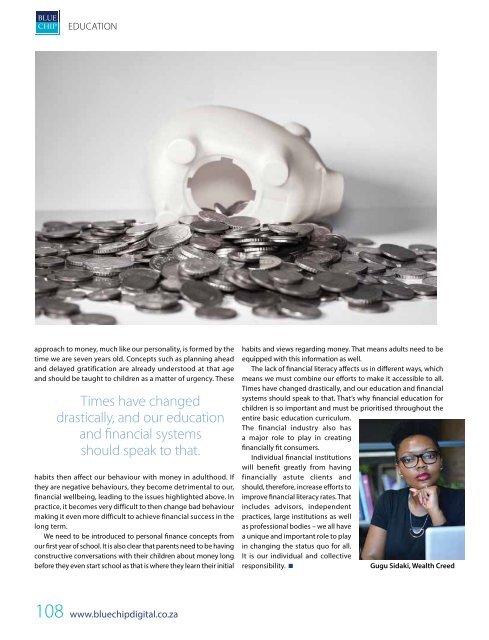Blue Chip Issue 81
Blue Chip is a quarterly journal for the financial planning industry and is the official publication of the Financial Planning Institute of Southern Africa NPC (FPI), effective from the January 2020 edition. Blue Chip publishes contributions from FPI and other leading industry figures, covering all aspects of the financial planning industry. Blue Chip takes this opportunity to wish the FPI a happy 40th anniversary. Congratulations!
Blue Chip is a quarterly journal for the financial planning industry and is the official publication of the Financial Planning Institute of Southern Africa NPC (FPI), effective from the January 2020 edition. Blue Chip publishes contributions from FPI and other leading industry figures, covering all aspects of the financial planning industry.
Blue Chip takes this opportunity to wish the FPI a happy 40th anniversary.
Congratulations!
You also want an ePaper? Increase the reach of your titles
YUMPU automatically turns print PDFs into web optimized ePapers that Google loves.
EDUCATION<br />
approach to money, much like our personality, is formed by the<br />
time we are seven years old. Concepts such as planning ahead<br />
and delayed gratification are already understood at that age<br />
and should be taught to children as a matter of urgency. These<br />
Times have changed<br />
drastically, and our education<br />
and financial systems<br />
should speak to that.<br />
habits then affect our behaviour with money in adulthood. If<br />
they are negative behaviours, they become detrimental to our,<br />
financial wellbeing, leading to the issues highlighted above. In<br />
practice, it becomes very difficult to then change bad behaviour<br />
making it even more difficult to achieve financial success in the<br />
long term.<br />
We need to be introduced to personal finance concepts from<br />
our first year of school. It is also clear that parents need to be having<br />
constructive conversations with their children about money long<br />
before they even start school as that is where they learn their initial<br />
habits and views regarding money. That means adults need to be<br />
equipped with this information as well.<br />
The lack of financial literacy affects us in different ways, which<br />
means we must combine our efforts to make it accessible to all.<br />
Times have changed drastically, and our education and financial<br />
systems should speak to that. That’s why financial education for<br />
children is so important and must be prioritised throughout the<br />
entire basic education curriculum.<br />
The financial industry also has<br />
a major role to play in creating<br />
financially fit consumers.<br />
Individual financial institutions<br />
will benefit greatly from having<br />
financially astute clients and<br />
should, therefore, increase efforts to<br />
improve financial literacy rates. That<br />
includes advisors, independent<br />
practices, large institutions as well<br />
as professional bodies – we all have<br />
a unique and important role to play<br />
in changing the status quo for all.<br />
It is our individual and collective<br />
responsibility. <br />
Gugu Sidaki, Wealth Creed<br />
108 www.bluechipdigital.co.za


















